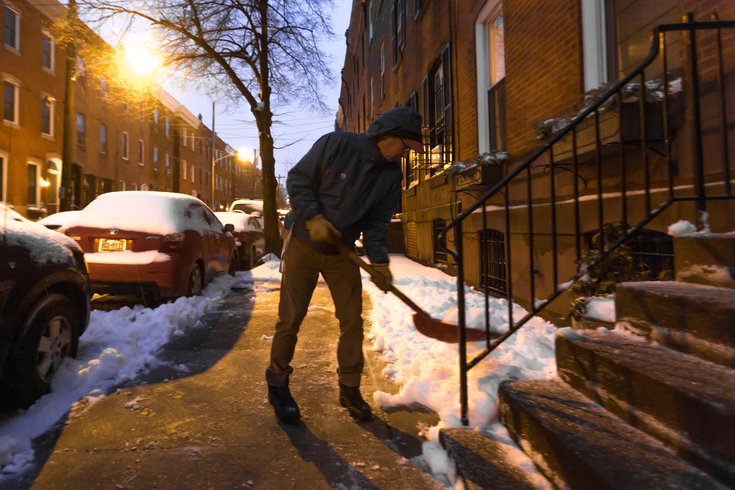
December 10, 2019
 Thom Carroll/PhillyVoice
Thom Carroll/PhillyVoice
Craig Welch shovels a mix of wet snow and ice from the sidewalk on North 24th Street, Tuesday, March 14, 2017.
Shoveling snow can be tough work. Many people wind up with aches and pains after shoveling out their car or driveway following a big snowstorm. For some, the task ends with a trip to the hospital.
About 11,500 Americans are treated in emergency departments each year for injuries related to shoveling snow. About 100 of them die of heart attacks.
The most common shoveling injuries are soft tissue injuries, lacerations, fractures and heart-related injuries, according to Consumer Product Safety data analyzed by the Center for Injury Research and Policy at Nationwide Children's Hospital in Ohio.
The risk of a heart attack becomes elevated when shoveling snow due to the dangerous combination of blood vessels constricting from the cold and heart rate and blood pressure spiking from the physical activity.
The quantity and duration of a snowfall also is associated with an increased risk of injury and death, particularly for men, according to a study in the Canadian Medical Association Journal. Researchers found that hospital admissions were 16% higher when there was more than eight inches of snow compared to snow-free days. The heavy snowfall also increased heart attack fatalities by 34%.
So how can you protect yourself this winter? Here are some tips from the National Safety Council and The Washington Post:
• Do warm-up exercises before starting to shovel.
• Take plenty of breaks. Never push through pain or exhaustion.
• Use an ergonomically designed shovel that doesn't require you to bend a lot.
• Hire someone to do the shoveling for you.
• Do not shovel immediately after eating or while smoking.
• Push the snow instead of lifting it.
• If you do lift, use your legs – not your back.
• If you are using a snow blower, keep your hands away from all moving parts, and turn it off immediately if it jams.
• Never run a snow blower in an enclosed space or you risk carbon monoxide poisoning.
• Never leave your snow blower unattended.
• Know the signs of a heart attack and call 911 immediately if you start to experience any of them.
According to the Mayo Clinic, the most common symptoms of a heart attack are pressure or tightness in your chest or arms that could spread to your neck, jaw or back; stomach issues like nausea, heartburn or pain; shortness of breath, lightheadedness, fatigue and breaking out in a cold sweat.
Don't wait to get help if you think you are having a heart attack. Early intervention can reduce the damage to your heart.